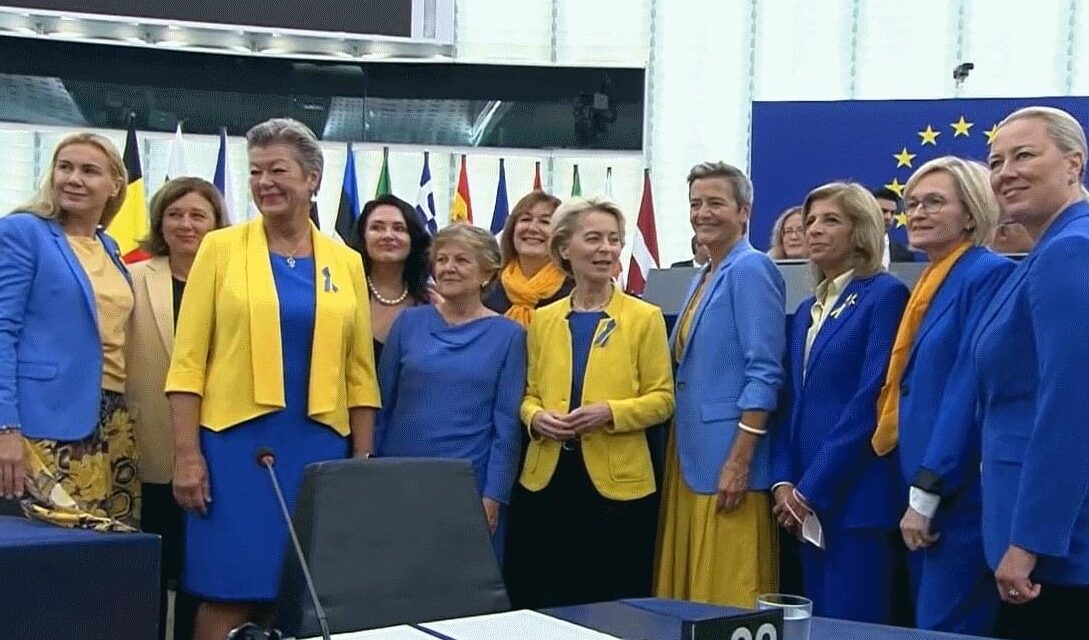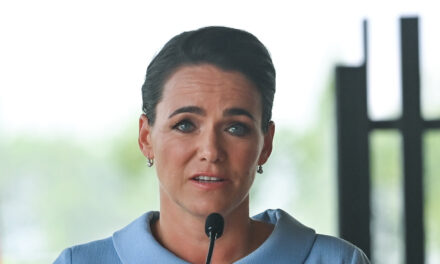If it were up to me, I would invite the ladies of the European Commission to the southern Hungarian border section for a long weekend. They could bring their female friends from the LIBE committee, they could wear their cute blue and yellow uniforms, and interested people from the European Parliament could also join the group. Let them see up close the refugees stuck at the Schengen border, look for women and children in need of protection among them!
In the evenings, I would have them watch the pictures from the thermal cameras, just watch the lurking groups as they make their way to the fence with ladders and other special tools suitable for cutting through the fence in their hands. I would also organize a night tour for them, and they could decide whether to ask for protective equipment for the moonlit border walk. I don't think they would initially ask for protective equipment against the defenseless refugees, they would be horrified by the question itself?
Then I would watch them run back screaming from the shower of mud and stones that stained their beautiful clothes.
I would also take them over to the Serbian side, I would order lunch at the csárda in Horgos. Maybe the innkeeper would quickly paint the inn, even put up a cymbal, so the guests can have fun! Although it is also possible that the csárda lives only in the Hungarian folk song, like the former Hungarians of Bácska village, since first the Serbs, and now the migrants, smoke them out of there.
Of course, the tragedy of this does not affect the people of Brussels, because what are the Hungarians looking for in Serbia anyway, how do they reason that this was ours, the Horgos csárda and the Makkhetes forest, don't they have some proper European name? I don't know if the ladies would even venture into that forest called the card deck, I would take them there too. Then they would finally be able to see face-to-face the long-trained Marcona men, whom nothing can deter from their original goal of reaching Western Europe. If necessary, they pull out a knife or a gun, which happens to be in their hands during the assertion of their interests.
I wonder if the people living in the phalanster in Brussels had a daily experience of rioting by migrant gangs trying to enter Europe, the crackling of guns, violence, disregard for private property, and in general the aggressive behavior of border violators against the Hungarian border guards protecting the Schengen border, would migration still be like this? to your question?
EU officials and Western politicians somehow do not want to take notice of the rioters, Molenbeek in Brussels, Favoriten in Vienna, Neu-Kölln in Berlin, the suburbs in Paris, the supposedly non-existent no-go zones. The refugee designation has run out of reasons at the moment, now only Ukrainians have a reason to flee. In its place, the words migrant, immigrant and similar, but loaded with positive meaning, are used in the planned migration reform. It seems that Western Europe still needs external (cheap) labor, but they want to raisin, i.e. they only need a qualified, young and integrable human supply to maintain a welfare society.
Yet that welfare society is bleeding from more and more wounds.
In France, about ten percent of the population is Muslim, that's more than six million people, which is constantly increasing due to mass immigration. An increasing factor is the outstanding fertility rate of Muslim women, which is almost three times that of the indigenous population. If the French do not find a solution, according to the demographic forecast, they will become a minority in their own country by 2060. For now, however, they should find a solution to the wave of violence unleashed by the insurgency imported from the United States, "Muslim Lives Matter" (MLM).
Germany is already a declared country of immigrants, according to last year's data, out of the 84 million people living there, a total of Hungarians, i.e. 13.4 million, are already foreigners, and 28 percent of the population has a migration background, that is, at least one of their parents is not German. In 2022, 2.5 million immigrants arrived in the country and 1.2 million left. This means a further tilt in the direction of the migration background.
Behind the numbers are people who need to be provided with living space.
Housing, kindergarten and school places, health care, social security, work. We would need specialists who would build apartments, teachers who would raise, teach and socialize children from other cultures who do not know German. (This is the real professional challenge, I would say quietly to the local teachers.) We need hospital beds, doctors and nursing staff, and a (German) person in the offices to coordinate the increased work. The provincial governments and local governments - because the problem is well distributed on the basis of internal quotas - would need money for all this, and there is less and less of it lately.
It would be possible to prepare statistics on the composition of the population of the EU countries. From the Scandinavians to the South, for various reasons, but mainly Muslim and African migration is increasing.
They have now come to the point where they want to get rid of the consequences of the great enthusiasm for inclusion.
For example, from problematic immigrants who don't want to work, but to live well off the benefits and continue their own habits instead of integrating. The West has already realized that it has no chance of deporting the undesirable elements, so by reimposing the distribution quota, they are trying to force the surplus down the throats of the Central and Eastern European countries that reject migration.
It won't work, it's stuck in the Hungarian and Polish grid. It is not that solidarity is lacking in these countries. Since the outbreak of the Ukrainian war, ten million (!) Ukrainian refugees have arrived in Poland and one and a half million have remained there. After them, the EU pays two hundred (!) euros per person, that's how much a Ukrainian refugee is worth, or I could say it's simple EU arrogance: let a second-rate member state pay that much. Of course, the Poles were enraged when they heard about the 20,000 euros that triggered the quota.
With us, I think many other factors play a role in the rejection. The Hungarians are neither relatives nor acquaintances of anyone, they have been a lonely people in the middle of Europe for a thousand years. We do not want to become a country of immigrants, the Prime Minister repeats, and with good reason. When it comes to immigration, I always think of Hungary's historical past.
For centuries, the Kingdom of Hungary welcomed everyone: Germans fleeing famine, Kuns fleeing Tatars, Serbs fleeing Turks, Romanians, and Slovaks and Ruthenians trickling down from the mountains. He accepted until suddenly he noticed that he was in the minority in his own country.
Of course, this also required the conscious Habsburg resettlement policy after the expulsion of the Turks. The Habsburgs, in the spirit of divide et impera, tried to turn the accepted peoples against the Hungarians, and when the nationalities' aspirations for independence began at the word of the times,
seventy years were enough for the geopolitically unified thousand-year-old Kingdom of Hungary to disintegrate and the trauma of Trianon to occur.
After the loss of the country, the loss of the nation began. Just as an example: the Hungarian population of Kassa has shrunk from 75 percent to 2.65 percent in a hundred years, and that of the treasured Cluj from 82 percent to 15 percent. German citizens also disappeared from the cities. In 1910, they still made up half of the population, for example, in Timișoara or today's Slovakian capital, Bratislava. Their place was taken by Romanians (from 11 to 80 percent) or Slovaks (from 15 to 92 percent).
Give the pond a place to stay and it will leave the house, says the Hungarian proverb, and there is no homophobia or racism in this.
It's a simple historical experience, what happens when acceptance goes beyond a point, what happens when peoples of other cultures predominate in a city, in the country. I would like the Brussels elite, the French, Germans and other decision-makers who force migration and think in terms of distribution quotas to think about these facts, to feel the weight of political responsibility in their actions, for their country, for our culture, for the whole of Europe.
Author: historian Irén Rab
Source: Magyar Hírlap
Photo: Facebook













